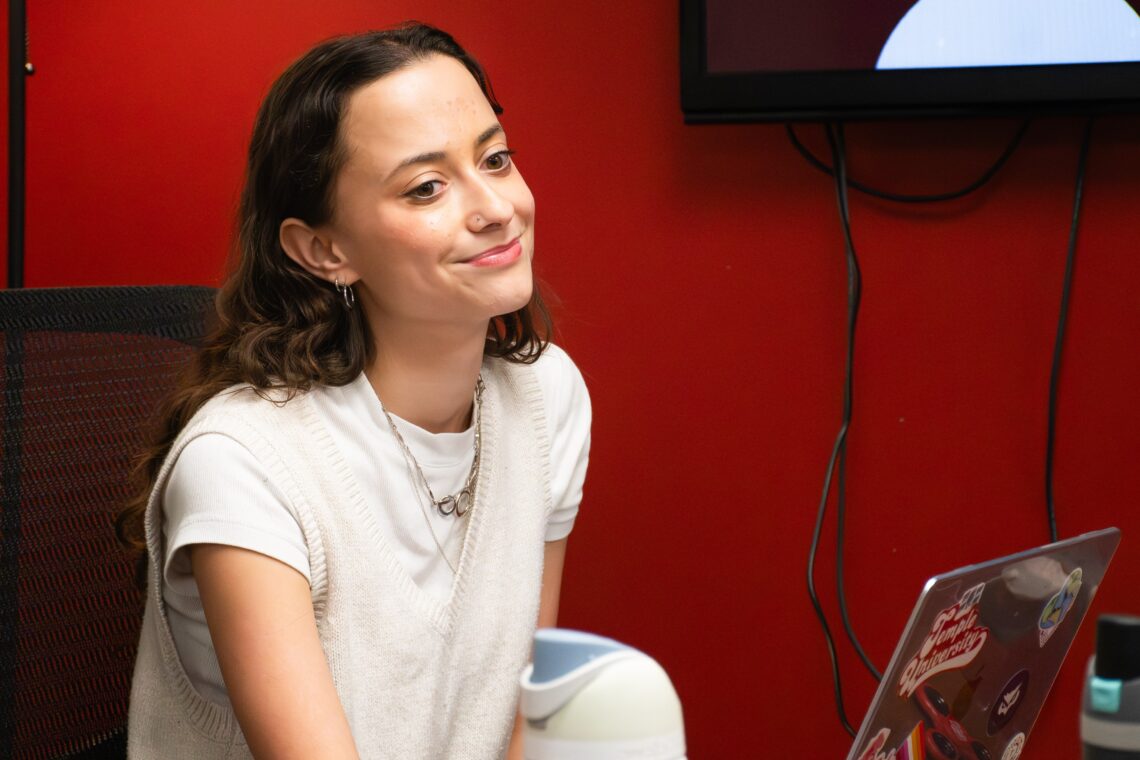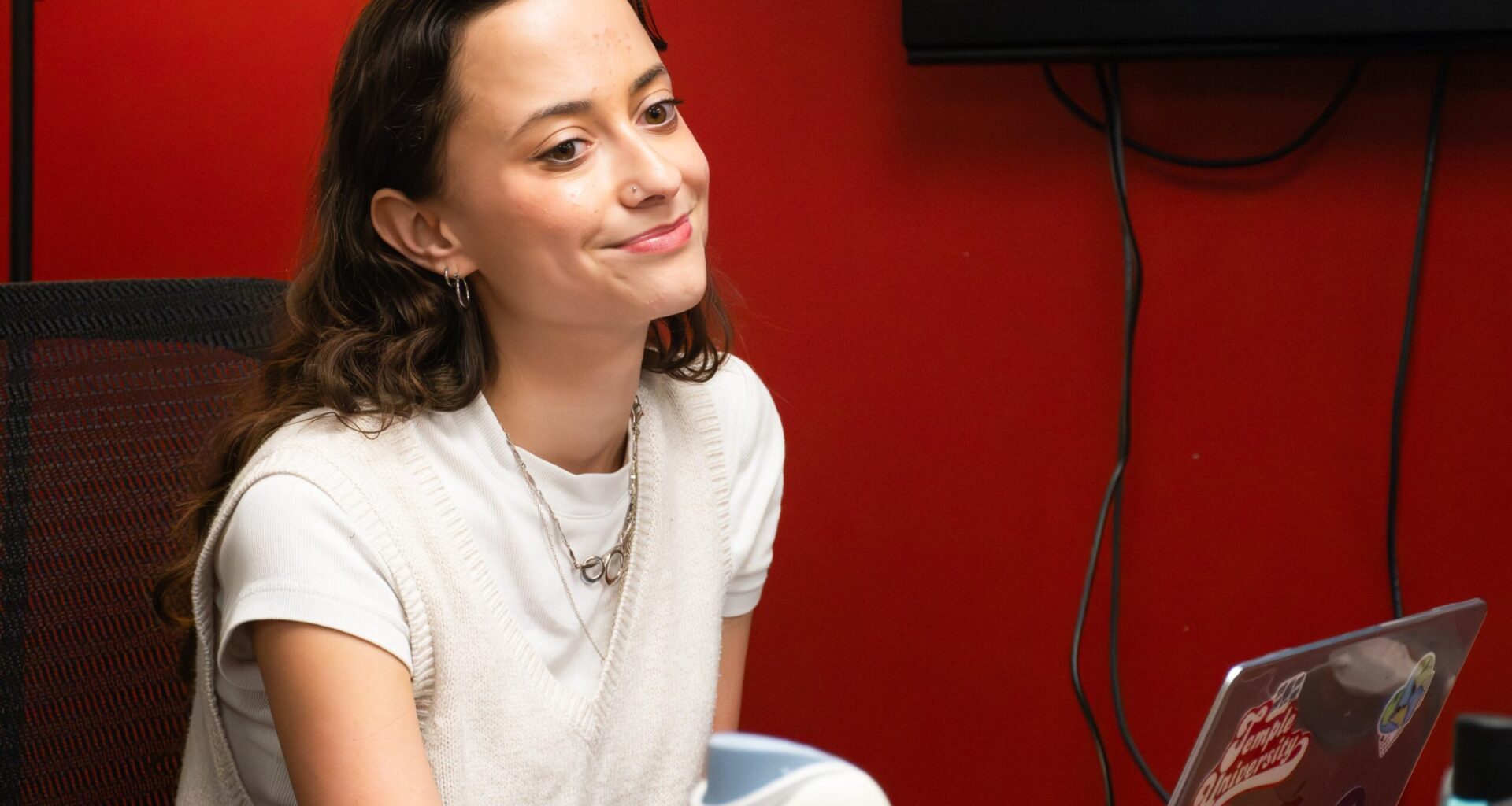 TSG President Lourdes Cardamone holding a TSG meeting on Aug. 28. | LILLIAN PRIETO / THE TEMPLE NEWS
TSG President Lourdes Cardamone holding a TSG meeting on Aug. 28. | LILLIAN PRIETO / THE TEMPLE NEWS
Temple Student Government President Lourdes Cardamone and Vice President Janeese Hochstetler want to strengthen ties between students and university administration during the 2025-2026 academic year.
They hope to make TSG more active in the Temple community by holding tabling events, having an open-door policy to their office and connecting students to campus resources.
“We really want to emphasize that we’re here to represent students and bridge the gap between students and administration and staff and faculty,” Cardamone said. “Senior administration can often feel like they’re out of reach for students, but that’s not necessarily the case. We’re able to advocate on [student’s] behalf, and they’re able to come to us and chat with whatever issues that they’re having.”
Their campaign, Temple Tomorrow, also emphasized refining and increasing the university’s public safety infrastructure, strengthening connections between campus organizations and crisis response training for student organization leaders.
Their proposed crisis response instruction will include first aid and sensitivity training. They will also instruct student leaders about on-campus resources like Tuttleman Counseling Services and the Wellness Resource Center.
TSG created a new position in their executive suite, the chief executive of equality, accessibility and wellness. The position aims to ensure the diverse student body is accurately represented and advocated for and will oversee initiatives like health equity and accessibility.
Temple Tomorrow also looks to revamp TSG’s Town Hall formats. In years past, the events have been similar to press conferences, but Cardamone and Hochstetler hope to encourage more interaction by inviting student questions and criticism during the event. They hope to center the events around specific topics and invite department chairs or relevant personnel for students to address directly.
They plan to hold their first Town Hall Sept. 15.
“I think a big distinction of what we’re trying to do this year, opposed to years past, is not only the tabling, which hasn’t really been done on a large scale, but being there and putting TSG into the Temple community as a resource,” said Peyton Giordano, TSG’s chief of staff.
Similarly, the new TSG administration hopes to launch a student feedback form on their website, providing a space for students to submit their concerns or suggestions for improvement pertaining to the university. Cardamone and Hochstetler will take feedback to President John Fry during monthly meetings.
Cardamone and Hochstetler’s consistent meetings with Fry are another new initiative in the 2025-2026 academic year. They will discuss their plans for new policies and programs directly with Fry, who will help determine if a project is feasible and point them in the right direction to execute it.
“We take a lot of the initiatives and ideas that we are workshopping or fully working on, either from our cabinet meetings or full-team meetings, and we take those to Fry,” Hochstetler said.
Another of TSG’s efforts to increase connectivity between university administration and the student body is tabling events. They plan to compile information about university safety, wellness and outreach initiatives and spread the word through on-campus events.
“If you walk into the Student Center and see us, we will have all the resources for you,” said TSG deputy chief of staff Caroline Kotch.
TSG has also connected students to on-campus organizations through their Instagram page, where they frequently share information about different clubs’ general body meetings and missions.
For smaller initiatives, Cardamone, Kotch, Hotchstetler and Giordano — TSG’s Executive Office of Leadership — will rely on their staff of students, who they hired before the school year began. These positions include their director of basic needs, director of student affairs and director of allocations.
“We have a lot of directors that we’re going to be giving them guidance on what our goals are,” Kotch said. “But they will then draft initiatives, and then we’ll have to go through them, make sure that they do align, but we are here for the directors, and we will make sure that things get done in a timely matter.”
On the whole, Cardamone looks forward to establishing stronger ties both within the Temple community and between Temple and its surrounding neighborhood.
“We’re serving the students,” Cardamone said. “But we’re also serving the greater community, because Temple is in North Philadelphia, and this community has been here long before us, so it is important that we acknowledge that and unite.”
Sophia Levine contributed reporting.
